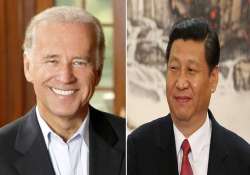Biden meets Xi, seeks to scale down tensions over air zone
Beijing: US Vice President Joe Biden today met Chinese President Xi Jinping and sought to scale down regional tensions caused by Beijing's unilateral declaration of an air defence zone over islands disputed with Japan in

Beijing: US Vice President Joe Biden today met Chinese President Xi Jinping and sought to scale down regional tensions caused by Beijing's unilateral declaration of an air defence zone over islands disputed with Japan in the East China Sea.
Biden, who had spent considerable time last year building up rapport and friendship with Xi before the Chinese leader took over the Presidency, said he believed Xi was a candid and constructive person.
“In developing new relationship between China and US, both qualities are solely needed,” Biden told Xi during their meeting at the Great Hall of the People here after his arrival from Japan today.
“Candour generates trust. Trust is the basis on which real change, constructive change, is made,” he said, while trying to prevail over the Chinese leadership to have a rethink on their decision to set up an Air Defence Identification Zone (ADIZ) over the disputed islands in the East China Sea.
The US, Japan and South Korea have already rejected the Chinese ADIZ and flew their defence planes violating the Chinese stipulation that all flights passing through the zone have to file their flight plans with China.
“This (US-China) is a hugely consequential bilateral relationship that is going to play a significant part in affecting the course of the 21st century,” Biden told Xi.
“This new model of major-country cooperation ultimately has to be based on trust, and a positive notion about the motive of one another,” he said.
Biden's trip, which began in Japan and ends in South Korea, comes amid a furore over Beijing's declaration of ADIZ.
China's assertiveness demonstrate the challenges US faces specially to its policy of “pivot” towards Asia and its security alliance with Beijing's great rival Japan.
Xi called Biden an “old friend” and told him, “You have long been committed to the growth of China-US relations and I commend you for the large amount of work you have taken.”
Relations had generally maintained “positive development”, he said, noting that the region and globe were undergoing “complex changes” and “regional hot spot issues keep cropping up”.
Speaking highly of the sound momentum of ties, Xi said China and US as two major economies and permanent members of the UN Security Council, share important obligations to maintain world peace and stability and promote development.
Biden, who had spent considerable time last year building up rapport and friendship with Xi before the Chinese leader took over the Presidency, said he believed Xi was a candid and constructive person.
“In developing new relationship between China and US, both qualities are solely needed,” Biden told Xi during their meeting at the Great Hall of the People here after his arrival from Japan today.
“Candour generates trust. Trust is the basis on which real change, constructive change, is made,” he said, while trying to prevail over the Chinese leadership to have a rethink on their decision to set up an Air Defence Identification Zone (ADIZ) over the disputed islands in the East China Sea.
The US, Japan and South Korea have already rejected the Chinese ADIZ and flew their defence planes violating the Chinese stipulation that all flights passing through the zone have to file their flight plans with China.
“This (US-China) is a hugely consequential bilateral relationship that is going to play a significant part in affecting the course of the 21st century,” Biden told Xi.
“This new model of major-country cooperation ultimately has to be based on trust, and a positive notion about the motive of one another,” he said.
Biden's trip, which began in Japan and ends in South Korea, comes amid a furore over Beijing's declaration of ADIZ.
China's assertiveness demonstrate the challenges US faces specially to its policy of “pivot” towards Asia and its security alliance with Beijing's great rival Japan.
Xi called Biden an “old friend” and told him, “You have long been committed to the growth of China-US relations and I commend you for the large amount of work you have taken.”
Relations had generally maintained “positive development”, he said, noting that the region and globe were undergoing “complex changes” and “regional hot spot issues keep cropping up”.
Speaking highly of the sound momentum of ties, Xi said China and US as two major economies and permanent members of the UN Security Council, share important obligations to maintain world peace and stability and promote development.